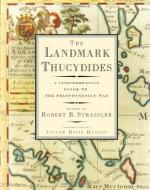|
This section contains 7,388 words (approx. 25 pages at 300 words per page) |

|
SOURCE: "Thucydides," in Thucydides and the Science of History, Oxford University Press, 1929, pp. 14-34.
In the following excerpt, Cochrane identifies Thucydides as a "scientific" historian, demonstrating that "Thucydides adapted the principles and methods of Hippocratic medicine to the interpretation of history" and further asserting that therein lies his "power and originality. "
Ideas such as those enunciated by the Hippocratic school were unquestionably floating about in the Hellenic world as early as the middle of the fifth century B.C. Herodotus, for example, was well aware of the requirements of a genuinely scientific hypothesis, as he showed by his refusal to accept the theory of a 'stream of ocean', or any other figment of the poetic imagination, as an adequate explanation of the periodic rise and fall of the waters of the Nile. He also displayed familiarity with the theory that physical conditions determine human character, when he remarked...
|
This section contains 7,388 words (approx. 25 pages at 300 words per page) |

|


